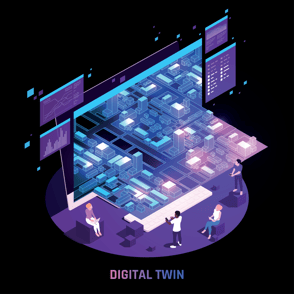
In its 2017 report, Reinventing Construction: A Route to Higher Productivity, the McKinsey Global Institute estimates that inefficiency costs the global construction industry over $1.6 trillion per year, primarily as a result of industry fragmentation. Diving a bit deeper, MGI further estimates that collaboration issues, supply chain management inefficiencies and lack of technology adoption combine to create about one-third of this inefficiency... about $500 billion dollars annually. These factors suggest that a reinvention of the construction supply chain will make a large impact on improving productivity.
This is the third post of a 3-part series that discusses how technology will affect the infrastructure product manufacturing industry. In the first we discussed why the construction industry will embrace the Internet-of-Things. In the second we presented the role that smart infrastructure products will play in the future of civil projects. In this we provide our vision for how technology will enable the industry to reinvent itself as new, more efficient competitors enter the market.
This has already started. New mega-companies (think Amazon in retail) are disrupting the market with operating efficiency that they provide by virtue of their vertical integration. Two such companies, Katerra and Skender, have gained a lot of traction lately. Both are primarily focused on commercial construction but it is not hard to envision how similar practices will be adopted in civil construction.
Katerra was founded in 2015 and bills itself as "a Silicon Valley start-up that is redefining the multi-trillion dollar construction industry". It is a technology company that applies itself to the challenge of construction industry productivity. Key to its strategy is that it is vertically integrated, performing design, procurement, manufacturing and construction services for its customers.
Skender is another company that is consolidating the supply chain. Originally a general contractor, Skender bills itself as offering "extreme integration" of design, manufacturing and construction services. It applies its SkenderLean™ approach, combining lean manufacturing and lean construction practices to limit waste and optimize customer value.
One common theme between these two companies is their recognition that plant manufacturing is more efficient than construction in the field. This speaks well for precast and prestressed concrete manufacturers. However, legacy companies still must overcome the inherent inefficiency of a fragmented supply chain. For this, the answer is technology.
In order to avoid disruption by the superior productivity of vertically integrated construction firms, legacy companies must integrate virtually on a common platform. This technology platform will seamlessly connect each party in the supply chain to any other party with which it does business, thereby eliminating the inefficiency of fragmentation. At the core of this will be the collection of data that can be disseminated to: (1) other software systems used by the manufacturer; and (2) other parties on the platform.
We expect Idencia to be at the center of this, as follows:

Manufacturers must first adopt software technology designed to manage internal operations and automate interaction with other members of the supply chain. The four basic categories are:
BIM Building Information Design system through which the manufacturer can interface with the customer in designing products to be used in the project and into which it can contribute as-built information for use by the project owner in maintenance.
Scheduling system that manages production scheduling and connects the manufacturer to its vendors for just-in-time manufacturing.
Production/Testing system that optimizes production and interfaces with testing equipment to ensure quality assurance standards have been met.
Enterprise Resource Planning system used to manage company operations as well as interface with customers and vendors through electronic issuance of invoices, purchase orders and payments.
The Manufacturing Execution System (MES) platform is the foundation that stitches this all together. It collects production data from the plant and integrates with each of the internal information management systems described above to provide real-time updates. It also provides a universal application programming interface (API) for connection to external systems (or platforms) used by customers and vendors, thereby minimizing the number of API connections that must be made. This is kind of like using a power strip to plug many appliances into one outlet.
Manufacturers that participate on the platform can compete effectively against vertically integrated companies because this seamless virtual integration compares favorably with the efficiency of vertical integration. But it offers something more as well... the advantage of supply chain diversity.
A vertically integrated supplier possesses a lot of power by virtue of all the services it provides. Working with a multi-party supply chain balances the concentration of power for the project owner. It also mitigates the risk of catastrophe that would otherwise occur if the vertically integrated vendor ran into trouble.
The rapid rise of companies like Katerra (valued at more than $1 billion in just 4 years of existence) and Skender make clear that manufacturers cannot expect to compete in 2019 like they did in 2015. The landscape is shifting very quickly and the industry needs to be keenly aware that it is happening.
Idencia will work with you to manage it. Let's talk.
About Idencia
Our mission at Idencia is to elevate the productivity of infrastructure product manufacturers. We offer RFID tracking solutions that improve productivity and offer value throughout the value chain. As a cloud-hosted product tracking system that is seamless between manufacturers, contractors and asset managers, Idencia adds information value to all, eliminates redundancy and saves time.

Feb 22, 2019 12:37:14 PM





Comments